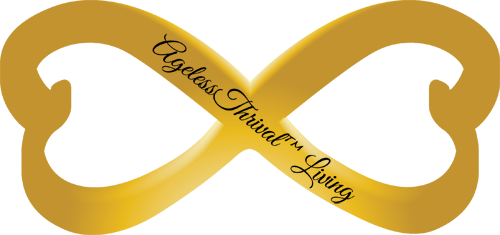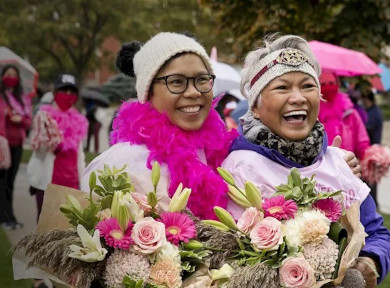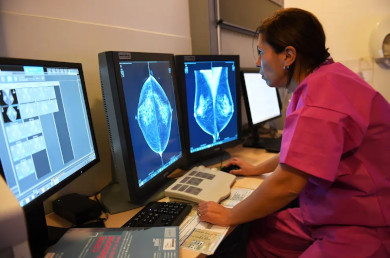The 7 Things I Learned About Managing Life With Cancer
by David M. Klaus

Source: Cancer.net
David M. Klaus lives with his wife Laura in Bethesda, Maryland, when not spending time at their second home in Woodstock, Vermont. He retired from full-time work at the end of the Obama Administration, where he served as Deputy Under Secretary of the U.S. Department of Energy. When not reading, playing golf and tennis, or enjoying his 2 children and grandson, he serves as Senior Advisor to a major consulting firm and is on the boards of nonprofit organizations.
Twenty months after being diagnosed with stage 2 bladder cancer, the computed tomography (CT) scans of my chest, torso, and abdomen came back clear. No cancer. Over the course of those 20 months, I was wheeled into an operating room for surgery 5 times, treated with 6 weeks of chemotherapy, received daily radiation therapy, and was infused with an immunotherapy drug as part of a clinical trial. I spent 5 days in the hospital with a life-threatening infection and acute kidney failure, followed by 3 months with nephrostomy tubes to drain urine from my kidneys. I also had multiple CT and magnetic resonance imaging (MRI) scans and countless blood draws combined with regular doctor visits and hours spent in waiting rooms. Post-cancer, I no longer have a bladder and live with an ostomy bag that I manage on a daily basis. I also get surveillance CT scans every 6 months to watch for cancer recurrence.
Throughout my cancer experience, I not only had to reorganize my day-to-day life to accommodate treatments and appointments, but I also had to adjust to my new identity as a person with cancer. Fortunately, I am now cancer-free—a cancer survivor—but the experience will be with me for the rest of my life.
As I went through cancer treatment, I received some great advice and gained some lived wisdom. Here are some of the things I learned that I hope may be helpful to others who find themselves, a loved one, or a friend on a cancer journey of their own.
-
When you are asked to make a treatment decision, make the best decision you can with the information you have at the time. Then, don’t look back. There is nothing to be gained by being hard on yourself over a decision you made when there is nothing you can do to change it. When I was diagnosed with bladder cancer, I had a choice between having my bladder removed or receiving a bladder-saving treatment that included surgery, chemotherapy, and radiation therapy. I have no regrets that I chose to try to save my bladder even though it ultimately had to be removed later on. I was—and am—confident I made the best decision I could have made given what I knew and understood at that time.
-
Take it day by day (or hour by hour, or minute by minute). There may be times when your condition or the treatment seems impossible to manage. Remember that you don’t always have to focus on the big picture. Sometimes, you just have to make it through whatever is next. I found that I could survive 30 days of daily radiation therapy if I took it one day at a time, and I could make it through a blood draw or 45 minutes in an MRI machine by focusing on a favorite memory or the fact that it would be over soon.
-
If you have a spouse or partner, include them when and where you can. Your cancer has the potential to change their life as well as yours. As long as you are comfortable doing so, let your spouse or partner come to appointments and be part of the decision-making process. There may also come a time when you need them to be informed and involved in your care on your behalf. This happened to me when I was hospitalized with an infection that left me at times confused and unable to fully track what was going on or remember important discussions with the doctors. Having my wife there was essential to making a critical treatment decision and helped relieve me from the stress of needing to manage a difficult situation on my own.
-
Talk with others about your cancer. Talking about your cancer can be helpful, even if it isn’t pretty. Although bladders are not the usual topic of dinner table conversation, I made a conscious decision that it would not keep me from sharing my thoughts with others and giving them an opportunity to provide support.
-
Live your normal life as much as you can. As challenging as this can sometimes be during treatment, I found that it is important to try not to let the cancer isolate you from others, define who you are, or control your life.
-
Find a cancer doctor you trust and respect. Deciding who will direct your cancer care is perhaps one of the most significant choices you will make during cancer. And, a good relationship with your doctor can make a big difference down the road.
-
Accept help and support from your family and friends. It really does make a difference.
The author has no relationships relevant to this content to disclose.


 Make a difference for Canadians with breast cancer
Make a difference for Canadians with breast cancer April is Daffodil Month
April is Daffodil Month Scientists Hail "Major Breakthrough" in Breast Cancer Treatment
Scientists Hail "Major Breakthrough" in Breast Cancer Treatment